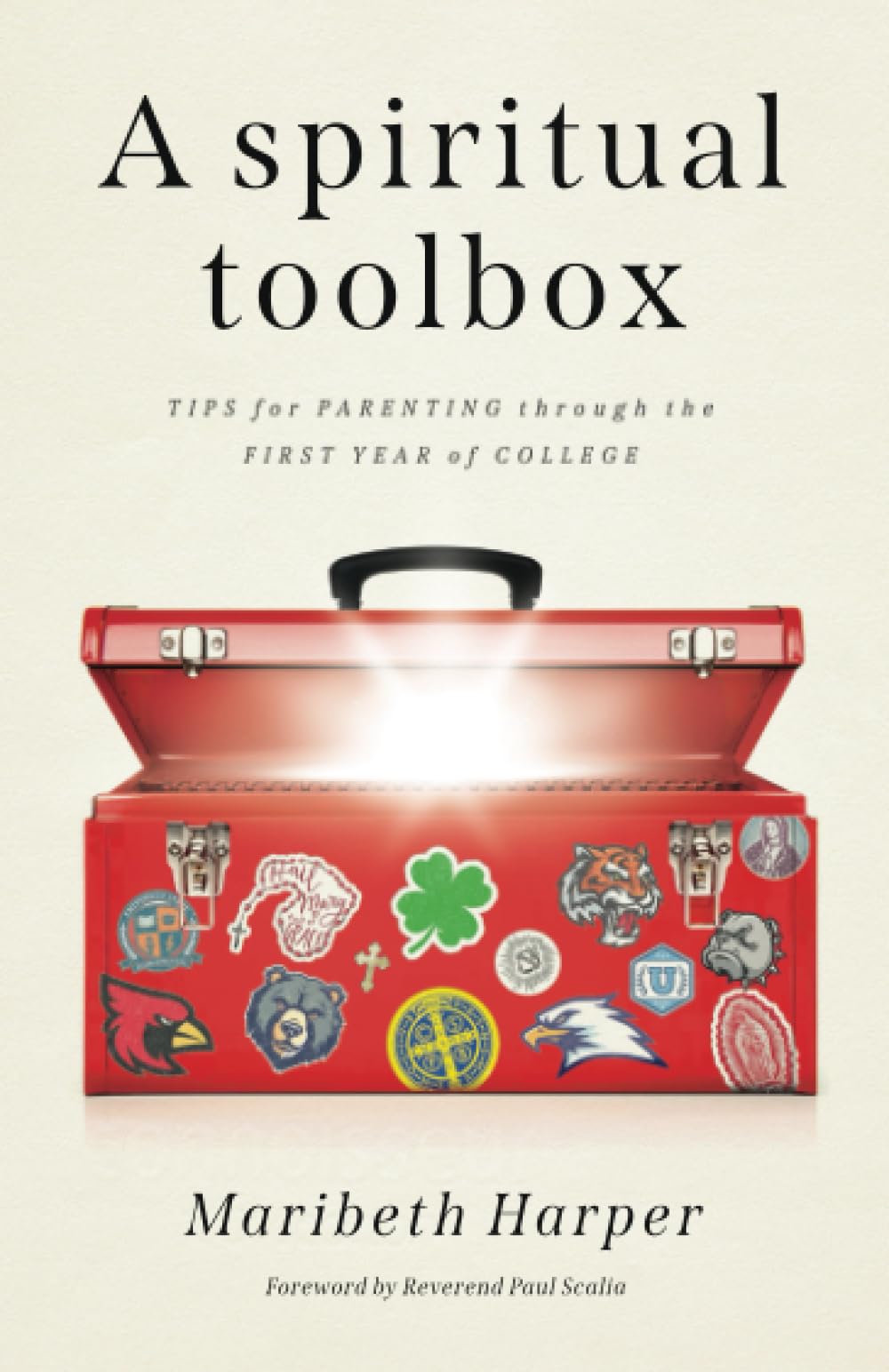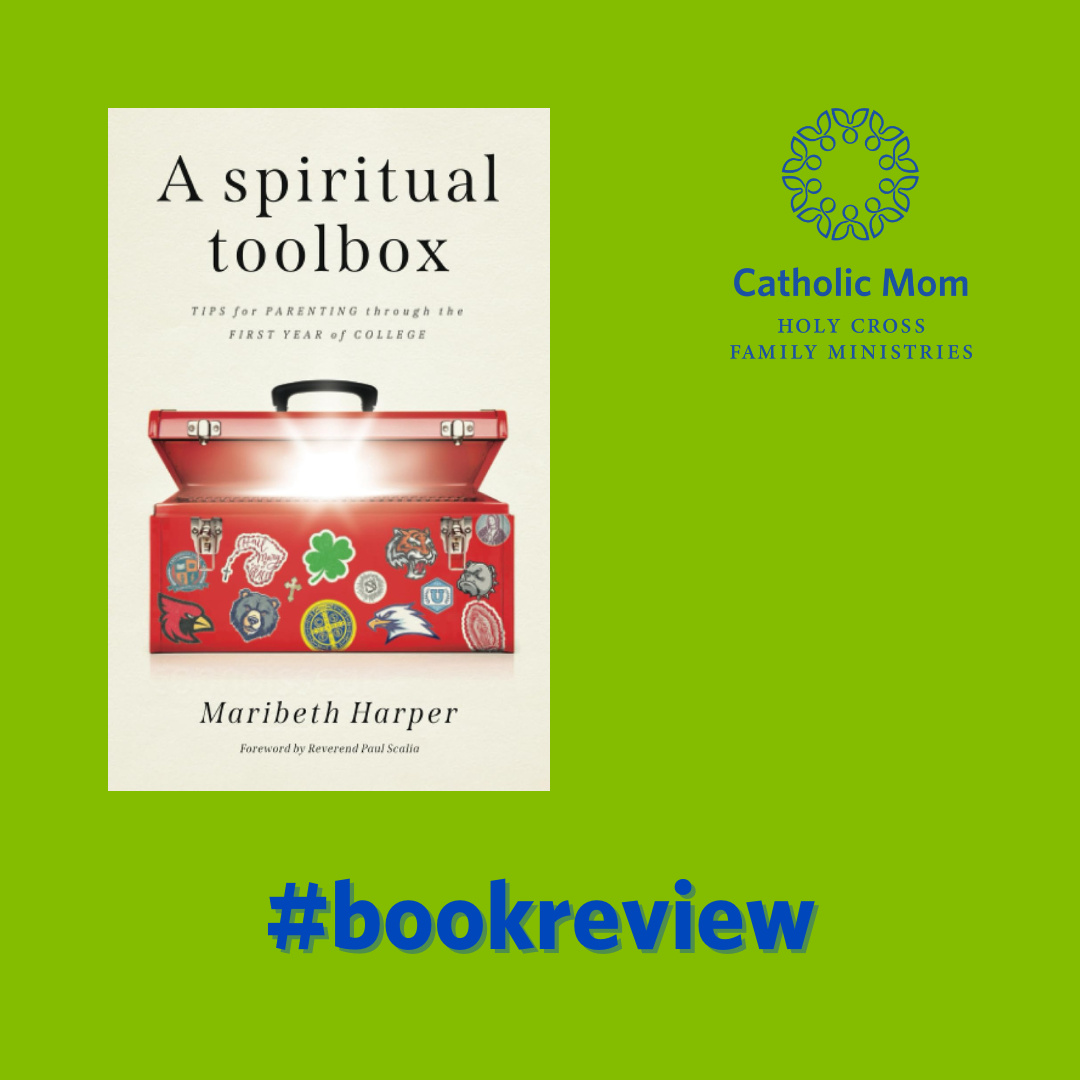
Kimberly Andrich reviews Maribeth Harper’s A Spiritual Toolbox, a book written for parents of first-year college students.
The transition from high school to college can be life-changing, not only for young adults but also for their parents who have, most often, raised their just-turned-adults from infancy. College opens up a whole new world to the students, and the parents feel a loss of control and even of knowledge of what their children are doing in this new world. Parents find themselves both excited for their children and apprehensive. Did I prepare my child for all the things he will encounter? Did I pass down the faith well enough that she will continue to go to Mass and perhaps even further pursue her faith?

We moved our first child to college a few weeks ago, and, though I prepared myself for it, his absence has created an empty space, both at the table and in our hearts. I am finding myself wrestling to accept the fact that I am not there to witness all the changes in his life and that he will meet people and encounter ideas and situations without our presence and proximate guidance. I am learning to let go and to be there for him in a new and different way, in part with the help of a book by Maribeth Harper: A Spiritual Toolbox: Tips for Parenting through the First Year of College.
In this book, Maribeth is not afraid to tackle the difficult subjects that our college-age kids will face, especially in today’s society. Topics she covers include homesickness, faith and Mass attendance, holy intimacy, gender ideology, finances, and more. She also tackles the grief that many parents feel after they return home without their child.
Maribeth does offer suggestions of actionable steps, but the strength of her book, first and foremost, is in its emphasis on prayer and on transforming our own lives, as parents and as children of God. She makes the point throughout that our biggest mode of influence on our college children is through our example and, most of all, through our prayer and our living the faith and offering that for them. This is where her book really shines—in teaching us parents how to transform our own lives and offer that to God so that He can use it to also transform theirs. In addition to encouragement within the chapters, at the end of each chapter she offers a prayer, questions for reflection, a memory verse, and a challenge.
Maribeth speaks to that emphasis within the first pages:
Be warned, however, that these faith-based tips may transform your life as well as impact your child’s. By knowing deeply our beautiful faith, praying regularly to the Lord who loves us, and relying on the promises of Jesus found in Scripture, we raise a protective shield around our children and draw Our Lord’s peace into our lives and theirs. (p. 8)
This can be comforting to parents whose children are wanting to do everything without their help, or, perhaps even more, whose children are not making the choices they had hoped they would make. Reading this book brings to mind Saint Monica, whose prayer and sacrifice were of comfort to her when a then-sinful, pagan Augustine left for a distant land. Like God did for Saint Monica, we can be assured that God hears our pleas, accepts our sacrifices, and applies them to our children. Also, like Saint Monica, who traveled the road to sanctity while praying for her son, our trust and reliance on Him for our children’s wellbeing can also play a large role in our path to holiness.
There is one concern I had while reading that I believe needs to be shared: when writing a book that covers controversial topics, such as same-sex attraction, one does run the risk of making people uncomfortable or of writing something with which some will disagree. Those who read Maribeth’s book will likely agree that people who are same-sex attracted are obligated to practice chastity and also that they carry a heavy cross and need much love and compassion. However, regarding the origin of same-sex attraction, there is less consensus. Maribeth seems to imply that same-sex attraction is natural and often presents from a young age, while others believe that, for at least some and perhaps the majority, environmental, social, and emotional factors play a larger role. Those people may feel uncomfortable reading this particular chapter. However, I think that the general principles shared in this book are helpful for both groups.
Maribeth Harper’s A Spiritual Toolbox is an excellent book for the parents who are sending children to college and who want the college years to be fruitful for both their young adult children and for themselves.

Copyright 2023 Kimberly Andrich
Images: Canva
About the Author

Kimberly Andrich
Kimberly Andrich is a wife and a mother of 5, to two big boys and three little ladies. She enjoys deep conversations over a cup of hot tea and twilight walks with her husband. Kimberly writes from the perspective of having a hidden, chronic illness and experiencing a deep, continuous conversion through being yoked to Jesus in the day-to-day trials and joys of life. Follow her on Instagram @FallingOnHisGrace.


.png?width=1806&height=731&name=CatholicMom_hcfm_logo1_pos_871c_2728c%20(002).png)
Comments